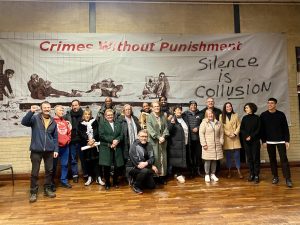Bloody Sunday Programme 2016
23 December 2015
Injustice Exposed
Bloody Sunday is unfinished business.
The Inquiry Report published in 2010 met some but by no means all the demands of the campaign for truth and justice.
The Inquiry found that all of the dead and wounded had been unlawfully shot. But the key demand for prosecution of the perpetrators continues to be thwarted at every turn.
The Report left a shadow over Gerald Donaghey, murdered at Abbey Park – while exonerating the senior politicians and military top brass who had sent his killers into the Bogside. This is a disgrace and an insult to Gerald’s relatives.
The commemorative programme for 2016 reflects the diversity of those whose experiences we share: we march for the families of the Ballymurphy massacre and for the victims of the paratroopers’ killing on the Shankhill – as well as for the families of the hundreds across the North killed directly by the State or through collusion.
Bloody Sunday is emblematic, too, of much of the horror happening around the world. The Derry massacre has this in common with atrocities everywhere: that it was perpetrated with malice aforethought by men uniformed to represent a State which declares itself democratic and claims commitment to human rights. There are Bloody Sundays somewhere every day of the week. We remember all those victims also on the annual march.
This year’s programme also reflects the diversity of those whose experiences we share. We will hear from victims of police racism in Britain; from the environmentalists infiltrated and abused by undercover London police; from Dublin TD Clare Daly on political policing of Shannon airport and anti-water charges campaigners and from many other victims of State oppression.
Cultural events will include a new play at the Playhouse, “Hairy Jesus”, by award-winning writer and actor Donal O’Kelly, the Irish premier of the “Hard Stop”, a new documentary on the killing of Mark Duggan in London in 2011 and the launch of new book at the Culturelann, “The Media and Bloody Sunday”, by two Ulster University academics.
Bloody Sunday was a murderous assault on the people of the Bogside. But it didn’t arise from antagonism between “the two communities.” It was a crime planned in advance and condoned in the aftermath by representatives of the British ruling class.
The campaign for the full truth has lasted for 44 years. We will continue along the path, sustained by the knowledge that we are accompanied every step of the way by many who, even in far distant places of which we know little, add their voices to ours, as we echo theirs, in calling for justice for all.
